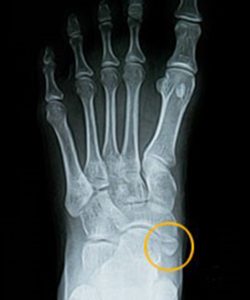Approximately 5% of the population, mainly females, are born with an extra piece of cartilage attached to the navicular bone on the inner arch of the foot. Â During adolescence this piece of cartilage ossifies and turns into bone, forming a noticeable lump. For the vast majority of people this genetic condition causes no problems at all, however it can problematic for some.
Why does Extra Navicular Syndrome become a problem?
The reason for problems developing in the extra Navicular bone is because of problems with a tendon called Tibialis Posterior, which attaches to the Navicular. The main job of this tendon is to control the arch and prevent the foot from rolling inwards. If this tendon attachment becomes inflamed after an ankle trauma, sprain or too tightly fitting shoes, it can result in Accessory navicular Syndrome.
What are the symptoms of Accessory Navicular Syndrome?
 Pain or ache in the medial arch of the foot
Pain or ache in the medial arch of the foot- Tender bony prominence on the medial arch
- Redness or swelling
- Pain wearing shoes and boots
- The pain increases with activity
- Flat feet (Pes Planus)
- Symptoms develop in adolescence of adulthood
An initial assessment by a physiotherapist usually reveals weakness in the foot stabilisers – Tibialis Posterior and the Peroneal muscles and tightness in the foot arch and calf muscles. An X-Ray can give a definitive diagnosis.
Early management is key for patients who suffer from Accessory Navicular Syndrome especially as most patients are adolescents who are still growing. We usually advise limiting activity and check patient’s footwear. Insoles can be a valuable tool in lifting the foot arch to take the pressure off the inflamed Tibialis posterior tendon where it attaches onto the Navicular. We advise ice and anti-inflammatories to help with the localised swelling on the foot. There is evidence that exercises can also make a difference. Strengthening exercises for the foot stabilisers and stretching for the calf muscles and foot arch relieve the pressure on the painful area. It is extremely important that good foot and calf biomechanics  maintained in adolescents to prevent other problems developing in the lower limbs as they grow.
What if Physiotherapy doesn’t work?
For those patients who do not respond to physiotherapy, a resting the foot in a cast boot for a few weeks will ease the inflammation and pain. After the cast is removed it is important to start strengthening your foot stabilisers and stretch your calf muscles and foot arch to prevent a recurrence. As a last resort, surgery to excise the extra navicular and reattach the Tibialis Tendon to a more medial part of the foot arch, followed by a resting cast for 4 weeks is successful in 90% cases.
If you think you have Accessory Navicular Syndrome please contact us at Harpenden Physiotherapy and book an appointment with one of our experienced physiotherapists. Alternatively, book a New Patient Assessment today.




